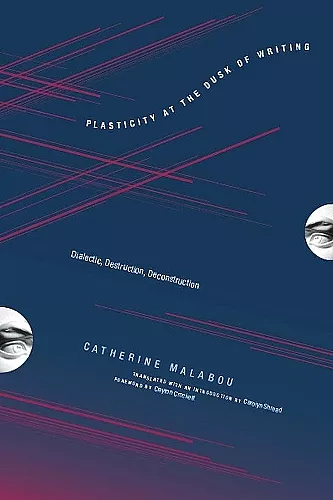Plasticity at the Dusk of Writing
Dialectic, Destruction, Deconstruction
Catherine Malabou author Carolyn Shread translator
Format:Hardback
Publisher:Columbia University Press
Published:4th Dec '09
Currently unavailable, and unfortunately no date known when it will be back

Catherine Malabou is one of the leading continental philosophers in the generation to emerge after deconstruction. Putting Derridean deconstruction into dialogue with the two chief models of philosophy that preceded it (Hegelian dialectic and Heideggerian destruction), Plasticity at the Dusk of Writing offers a clear account of the philosophical past in which deconstruction emerged-as well as a programmatic statement of what an attentive observer might see to be the future that could arrive in its twilight. -- Jeffrey Kosky, Washington and Lee University
A former student and collaborator of Jacques Derrida, Catherine Malabou has generated worldwide acclaim for her progressive rethinking of postmodern, Derridean critique. Building on her notion of plasticity, a term she originally borrowed from Hegel's Phenomenology of Spirit and adapted to a reading of Hegel's own work, Malabou transforms our understanding of the political and the religious, revealing the malleable nature of these concepts and their openness to positive reinvention. In French to describe something as plastic is to recognize both its flexibility and its explosiveness-its capacity not only to receive and give form but to annihilate it as well. After defining plasticity in terms of its active embodiments, Malabou applies the notion to the work of Hegel, Heidegger, Levinas, Levi-Strauss, Freud, and Derrida, recasting their writing as a process of change (rather than mediation) between dialectic and deconstruction. Malabou contrasts plasticity against the graphic element of Derrida's work and the notion of trace in Derrida and Levinas, arguing that plasticity refers to sculptural forms that accommodate or express a trace. She then expands this analysis to the realms of politics and religion, claiming, against Derrida, that "the event" of justice and democracy is not fixed but susceptible to human action.
Malabou has provided a tantalizing glimpse of the ways in which philosophy at the dusk of writing must increasingly become our own way to recognize our potentials in an era of plasticity. -- Brenna Bhandar and Jonathan Goldeberg-Hiller Theory and Event transformative -- Peter Gratton Symposium
ISBN: 9780231145244
Dimensions: unknown
Weight: unknown
136 pages